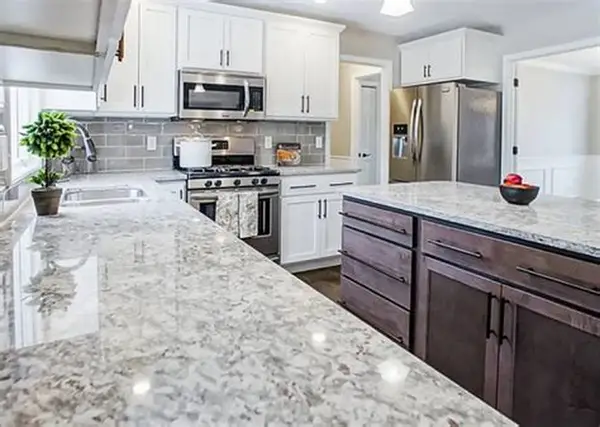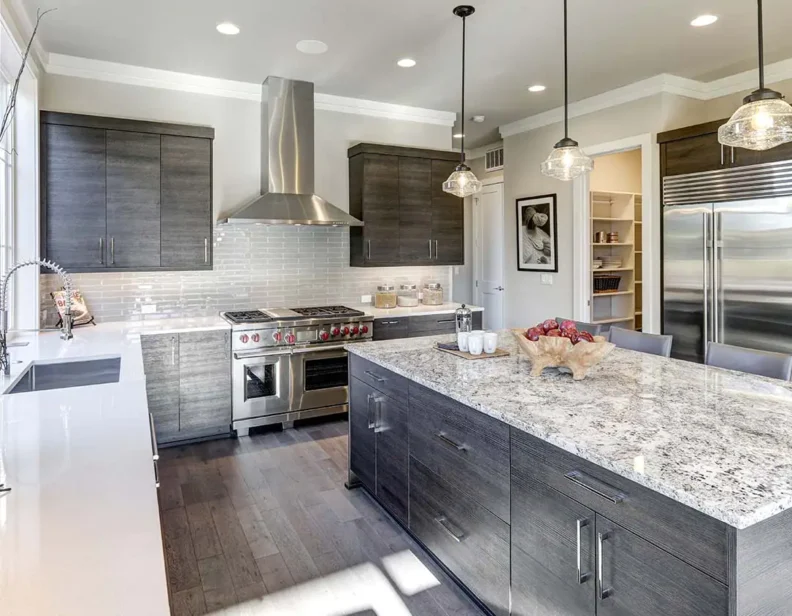
When it comes to premium surfaces for kitchens and bathrooms, two materials dominate the conversation: marble and granite countertops.
When it comes to premium surfaces for kitchens and bathrooms, two materials dominate the conversation: marble and granite countertops. Both are natural stones that exude elegance, yet they differ in appearance, durability, cost, and maintenance needs. Choosing between them can significantly influence not only the aesthetics but also the functionality of your space.
In this guide, we’ll compare marble and granite countertops in depth, exploring their unique qualities, pros and cons, and suitability for kitchens and bathrooms.

Understanding Granite Countertops
Granite is an igneous rock formed from cooled magma, known for its durability and unique natural patterns. Each slab is one-of-a-kind, with flecks, veins, and swirls that make it a statement piece in any room.
Granite is widely used in:
- Granite kitchen countertops for cooking and entertaining spaces
- Granite bathroom countertops for luxury and durability
- Outdoor kitchen surfaces due to its weather resistance
For more about granite’s geological origins, check out:

Understanding Marble Countertops
Marble is a metamorphic rock, primarily composed of calcite, which gives it its signature veining. It’s renowned for its classic, timeless appeal and has been used in sculpture and architecture for centuries.
However, marble is softer and more porous than granite, making it more susceptible to etching, scratches, and stains.
Granite vs Marble: Durability
- Granite countertops are harder and more resistant to chips, scratches, and heat. They can handle hot pots and pans, making them a favorite for avid cooks.
- Marble is more prone to etching from acidic foods like lemon juice and vinegar, and it scratches more easily.
If durability is your main concern, granite wins.
Granite vs Marble: Appearance
- Granite offers a wide range of colors—black granite countertops, white granite countertops, brown granite countertops, and even exotic options like blue pearl granite countertops. Each slab is unique, with patterns ranging from subtle to dramatic.
- Marble is prized for its elegant veining, often in shades of gray, gold, or green, set against white or cream backgrounds.
While marble offers a classic luxury look, granite provides more color diversity and natural variation.
Maintenance Requirements
- Granite countertops require sealing every 1–3 years to maintain their stain resistance. Daily care involves wiping with pH-neutral cleaners.
- Marble also requires sealing but is more high-maintenance due to its susceptibility to staining and etching.
For cleaning and sealing advice, see our guide on how to seal granite countertops.
Cost Comparison
When it comes to cost:
- Granite can range from affordable to high-end depending on the rarity of the stone.
- Marble often costs more than entry-level granite but less than rare exotic granite slabs.
If you’re weighing the financial side between granite and quartz, see:
Best Uses for Kitchens
Granite kitchen countertops are ideal for heavy-use cooking spaces thanks to their durability and heat resistance.
Marble, while stunning, is better suited for low-traffic kitchens or baking stations where its cool surface can be used for rolling dough.
For more on choosing materials for kitchens, read:
Best Uses for Bathrooms
In bathrooms, granite countertops handle high moisture and cleaning products well, especially when sealed. Marble can add spa-like elegance but may require more care to avoid water stains and etching from toiletries.
Pros and Cons at a Glance
Granite Pros:
- Extreme durability
- Heat and scratch resistance
- Wide range of colors and patterns
- Suitable for outdoor use
Granite Cons:
- Needs periodic sealing
- Can be heavy and require professional installation (stone fabrication)
Marble Pros:
- Timeless elegance
- Unique veining
- Cool surface for baking
Marble Cons:
- Higher maintenance
- Prone to staining and etching
- Softer and more scratch-prone
Final Verdict: Which Is Better?
If you prioritize durability, low maintenance, and variety, granite countertops are the clear winner. They’re perfect for busy kitchens, high-use bathrooms, and even outdoor applications.
If you prioritize luxury aesthetics and don’t mind extra maintenance, marble can be a show-stopper, particularly in low-traffic areas.

